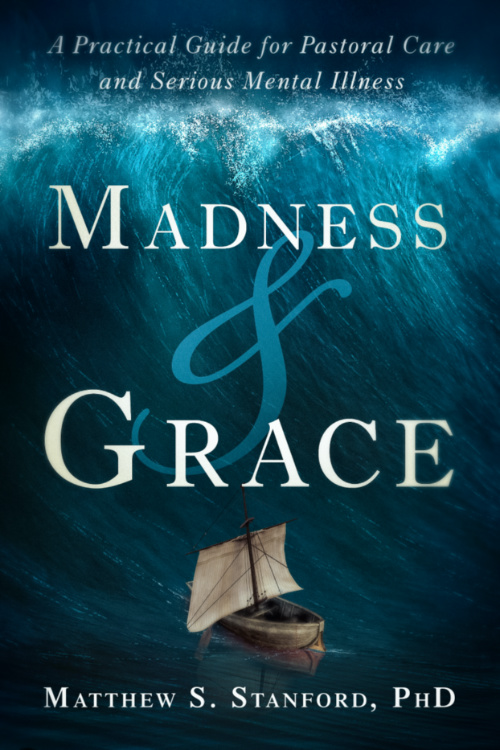
DAVID ADAMS reads Matthew S Stanford’s guide for those in ministry to understanding mental illness and how to respond to it…
Dr Matthew S Standford
Madness & Grace: A Practical Guide for Pastoral Care and Serious Mental Illness
Templeton Press, West Conshohocken, Pennsylvania, US, 2021
ISBN-13: 978-1599475790

“This book aims to provide a simple, easy-to-understand guide to identifying and then responding to mental illness in a way that is ‘Biblically rooted and clinically-informed’ – that is, a response that involves the application of both Biblical truth and psychological science.”
Matthew S Stanford is the CEO of the Hope and Healing Center & Institute in Houston, Texas, and has written this book to, in his words, “equip pastors, ministry staff and lay ministers to better serve and support those suffering with mental illness who want assistance from the church”.
We know the need – Stanford cites statistics from the US showing that one out of every five adults in the US will experience mental illness in a given year (data says it’s the same in Australia) – and we also know the issues surrounding care – among the barriers Stanford lists are the lack of availability, the cost and the social stigma which can be attached to seeking help. What you may not know is that research shows individuals in psychological distress are more likely to seek help from a member of the clergy before looking for help from their primary health carer or a psychiatrist.
All of which means, of course, that pastors and those working in ministry in the church are likely to confront mental health issues on a regular basis. And that Stanford presents as a “divine opportunity” – after all, are not churches “healing communities called by God to care for those in need”?
But, as he points out, what’s often lacking is confidence among clergy to recognise and then address to the issue. This book aims to help overcome that gap that by providing a simple, easy-to-understand guide to identifying and then responding to mental illness in a way that is “Biblically rooted and clinically-informed” – that is, a response that involves the application of both Biblical truth and psychological science.
Such an approach, writes Stanford, “relieves physical and psychological suffering in those with mental health problems while revealing the unconditional love and limitless grace that is available only through a personal relationship with Jesus Christ”.
The book takes a four part approach: the first part deals with how to recognise mental illness including in children and adolescents; the second deals with referrals to health professionals (and while Stanford is writing for the US context, it’s not too great a leap to adapt it to the context in which you’re living); the third deals with the important role church congregations can play in supporting those affected through healthy relationships; and the fourth looks at the types of therapeutic care churches can provide to help individuals and families grappling with mental illness.
Madness & Grace is littered with stories Stanford has encountered in his work to illustrate some of the issues people may face when encountering mental illness in a church context. There’s also a number of handy guides to responding to specific situations, such as what to look for when assessing the risk of violence in a situation. And there’s a detailed look at what Scripture has to say on the issue, particularly in reference to God’s concern for our mental well-being. It ends with a list showing how US churches of various sizes are responding to the issue in a bid to encourage others to take a more proactive approach.
Practical and balanced, Madness & Grace is one that should be of considerable value to anyone involved in ministry or pastoral care who’s looking for some guidance on how to respond to the issue of mental health.
In Australia, for anyone who is experiencing a personal crisis or thinking about suicide, call Lifeline on 131114.





